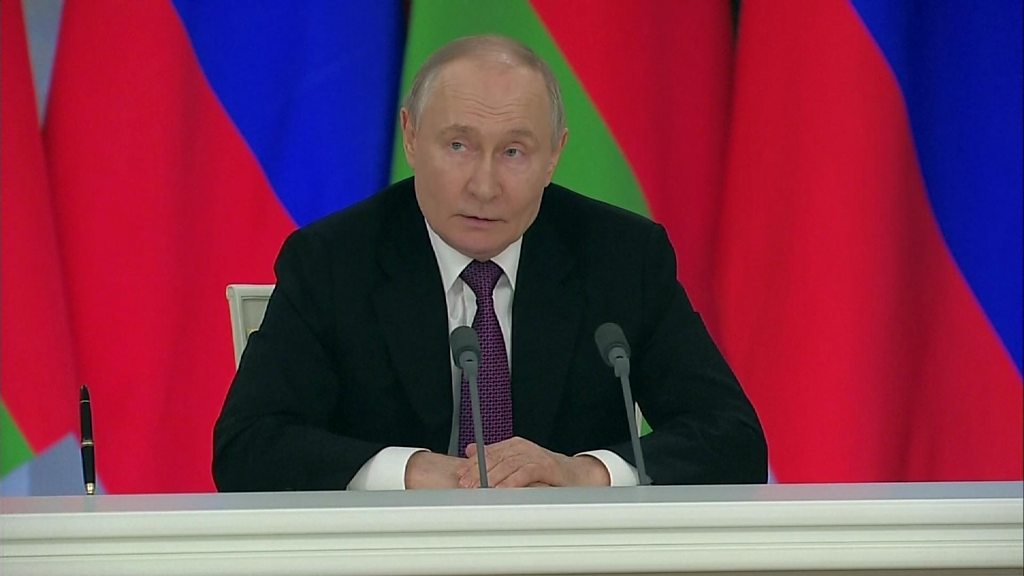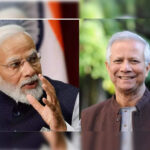By Anjan Roy
Despite his best efforts and concessions to the Russian president, Vladimir Putin, including a US vote in the UN alongside North Korea, Iran and Russia on Ukraine war, Putin has given a big hoax to US president.
The Russian president has flatly turned down Donald Trump’s proposal for an immediate ceasefire for 30 days which Ukraine had earlier conceded to Donald Trump. Now it has been made clear that Putin is in no mood to comply with the proposals as part of Trump’s efforts to stop the war.
Although America is dominated by Trump’s egoistic claim that once elected to power he would bring the war to an end within 24 hours, the Americans now realise what slip the Russian president had given them. All that remains for them to do is to move ahead with some extra pressures to bring him to the negotiating table.
Donald Trump had promised to slap severe sanctions on Russia and Putin in case they refuse to come to negotiations for ending war. These include two separate kinds of actions.
First would be to impose economic sanctions to hobble the Russian economy into a surrender. Already Russia is under severe strain from sanctions imposed so far, like restrictions on banking transactions and imposition of constraints on free trading in Russia’s principal exports.
These sanctions and restrictions have curtailed Russian sales of its most important exports, energy products. The restrictions have tended to depress the prices of Russian crude oils and natural gas. Their off take have also been affected as some of the major buyers have now moved away from Russian oil and gas.
Secondly, the Americans had sought to withhold the most critical inputs for Ukraine’s war efforts, namely, intelligence feedback which were most vital for Ukraine’s attacks on Russian military establishments with the use of American intelligence inputs. The Americans had cut off Ukraine from the intelligence inputs, following Zelensky’s disastrous meeting with Donald Trump at his Oval Office.
But with the Russian intransigence in full display the Americans have stepped up delivery of intelligence. One result of this resumption could be seen in a daring Ukrainians’ attack on an airbase 500 kms deep inside Russian territory. Russia maintains its nuclear capable strike bombers in this airport at Engles town. The Engles airbase hosts Russian Tupolev nuclear weapons capable aircraft. The main runway of this airbase has been rendered unusable was a major fire had engulfed the entire field.
Now with these developments it is clear for the American strategic and security experts, that the Russians have ditched the Donald Trump attempt at a quick ceasefire and then a peace agreement. But this failure hits the president personally and his image has been dented.
In view of the obvious public humiliation, the entire administration is gearing up to build a facade of progress towards a peace agreement. Instead of admitting its failure to entice Putin to come to negotiating table, Trump is trying to project and maintain his profile as the ace negotiator and deal maker.
A well known strategic expert has pointed that Putin is playing on a very long term game for recapturing one of Soviet Union’s strategic chokehold in southern European theatre. In the days of Soviet Union, Russia used to control the Black Sea as its captive “pond”.
Now that after the break up of Soviet Union, it lost the Black Sea and its adjoining territories. Romania and Bulgaria have strayed into the western sphere and Turkey already remains dominant member of NATO. Hence, Russia is seeking its fresh foothold on the coast.
Putin is playing on his longer term security perspective in which the Black Sea is a critical playground. Putin wants to take control of Black Sea, including Ukraine’s principal trading post, the Odessa port. Hence, Putin is ready to pursue his war with Ukraine and capture the territories along the Black Sea coast.
It appears he will not stop the Ukraine war until some of these longer term wishes are fulfilled. American diplomatic and strategic community are now seeing these longer term factors and hence they are veering round to advocacy of maximum pressure on Russia to stop the war. (IPA Service)

 Modi-Yunus Bilateral Summit A Must For Fixing India-Bangladesh Ties
Modi-Yunus Bilateral Summit A Must For Fixing India-Bangladesh Ties 